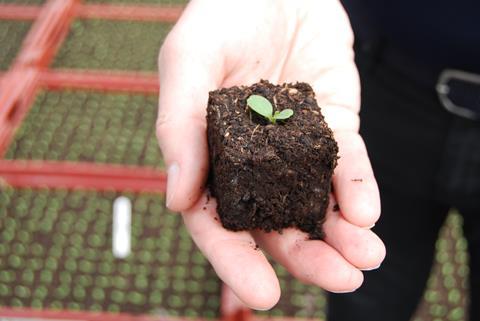Plant propagator reports operational benefits and no difference in plant quality as it transitions to peat-reduced blocking media

Specialist plant propagator Hillgate Nurseries says it has embraced peat-reduction without needing to refit its advanced production systems
Working with sustainable growing media manufacturer ICL, Hillgate is reporting significant operational benefits.
Founded in the 1980s as a labour-intensive grower of young plants in peat blocks, Hillgate now operates automated Flier Systems blocking lines, seeding equipment, and an efficient in-house transport system.
Still a family-run business, Hillgate produces over 200 million plants between December and August, with sowing rates peaking at 1.5 million plants daily.
“To optimise efficiency, many field producers of leafy salads, celery, leeks and brassicas rely on transplanted young plants,” says Troy Barton, Hillgate’s plant propagation manager. “Benefits include overcoming germination issues, reducing land wastage, and improving crop consistency.
“Our four blocking lines produce uniform, dimensionally stable blocks. Substrate consistency and its ability to remain intact are critical to our automated production as well as in-field transplanting.”
Staying ahead of legislation
Historically, Hillgate relied on deep-dug blocking peat, a stable and consistent material. “While the proposed peat ban for commercial horticulture in England and Wales was set for 2026, blocking is likely to have a time-limited exemption to 2030 due to technical barriers,” says Barton. “However, we want to stay ahead. Major UK supermarkets are pushing to reduce their carbon footprints and peat usage. Some aim for peat-free supply chains even before legislation requires it.”
The leader in peat-free growing media in the UK ornamentals sector with its Levington brand, ICL approached Hillgate in 2024 to develop peat-reduced blocking media.
“Alongside consistency and binding, other key priorities are nutrition and water-holding capacity,” says Stuart Gammage, ICL’s technical manager. “Our next-generation Levington Advance Blocking FT is 25 per cent peat-reduced and formulated with Fibagro Advance woodfibre, milled peat and a unique binder. This fusion technology (FT) – developed by scientists at our sister company Amega Sciences – ensures excellent block formation and integrity until roots are well established.”
Fibagro Advance is manufactured at ICL’s Scottish facility from FSC-certified by-products of the timber industry. Produced via a thermo-mechanical process, it is sterile when produced and supports lower peat usage without sacrificing consistency or performance.
In ornamentals, Fibagro Advance has been instrumental in the successful transition to peat-free media.
“To further enhance performance, we add H2Gro – our water management agent – to promote hydration and improve shelf life,” explains Gammage. “As peat-reduced media retains less nutrition, we include Osmoform and our base starter that provides full nutrition for at least four weeks, under standard watering regimes.”
Less peat, less emissions
“The new blocking media is designed to arrive drier and weighs considerably less, reducing both cost and environmental impact,” says Gammage. “Previously, our customers received 55m³ per lorryload of peat; now, we average 85–90m³. That means fewer vehicles, reduced haulage costs and emissions.”
“Switching our four blocking lines over to this next-generation media would cut our peat use by 5,000m³ in one season, and eliminate around 90 lorry deliveries,” says Barton. “In the future, as the peat content is further reduced, those savings are set to grow.
“The new peat-reduced blocking substrate is working consistently well with our Flier equipment – which was essential. It meant we didn’t need to refit, retool, or replace our 200,000 reusable blocking trays. The transition has been seamless.”
Operational benefits
In terms of nutrition, the results are promising. “It’s different but comparable overall,” says Barton. “Depending on the crop, we often don’t need to supplementary feed.”
At the start of the blocking line, water must be added to activate the fusion technology, binding the blocks. With lower water-holding capacity than pure peat, the role of H2Gro becomes essential.
“We’ve had to adapt our irrigation regimes,” says Barton. “But it’s allowed more precise control of water levels in the blocks and therefore the nutrition. That’s particularly useful for sensitive crops like leafy salads, which react strongly to Nitrogen.”
The product has also been robustly tested in the field. “We’ve conducted trials with several leading UK vegetable and leafy salad growers over two years,” says Gammage. “Levington Advance Blocking FT performed reliably in both spring and summer conditions. It meets environmental expectations without compromising crop quality.”
“Our customers have noticed no difference in plant quality,” confirms Barton. “The blocks remain stable during planting, perform well through machines, and transplant successfully using existing machinery.
“With such a large-scale operation, we can’t afford sudden major changes in our process – and neither can our customers, who transplant thousands of plants per hour. Especially in unpredictable seasons, stability is vital.”
“Troy has worked tirelessly to manage these peat-reduced trials in what is a phenomenally busy nursery,” adds Gammage. “His efforts have helped move the blocking industry forward sustainably. We aim to continue this collaboration and further reduce peat content – ultimately working toward a peat-free future for this vital segment of UK salad and vegetable production.”



